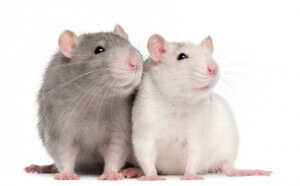Rats & Mice
Anyone who has owned a rat never goes back! Rats and their smaller cousin the mouse, make endearing pets. They are interesting, intelligent and have amazingly distinct personalities. Rats in particular can bond deeply with their human caregivers and make devoted companions. Rats and mice thrive on human interaction and require time and effort to be maintained in good health. Many of the rodent problems we see here at BBEVS are related to their diet or general care. In the wild, lots of hungry carnivores would think of rats and mice as dinner, so just like our other exotic species, rodents hide signs of disease and injury. The basics of rodent care include:
 Secure, safe enclosure with protection from the weather extremes and draughts
Secure, safe enclosure with protection from the weather extremes and draughts- Balanced, low calorie, low fat diet (see Rodent diet care sheet)
- Mite and worming prevention
- Desexing
- Regular health examinations
To learn more about how to keep your rat or mouse healthy follow the links above. A cornerstone of maintaining wellness in rodents is regular preventative health examinations. These examinations use a combination of physical examination and diagnostic testing to assess your pet for any early signs of disease, as early identification of disease provides the best chance of successful resolution. We also recommend veterinary assessment of all new pets. This is important for early identification of abnormalities and is particularly relevant if you already own rats or mice, as some diseases can spread rapidly from the new arrival to the other animals in your household. If you are new to rodent ownership, this initial consultation will ensure that you start your ownership armed with the most up-to-date knowledge for this particular species.
We require blood donors! Occasionally we require fresh blood from healthy rodents to perform a blood transfusion for a sick rodent patient. In order to be a blood donor, your pet must be an adult, have regular veterinary health examinations with BBEVS and be currently in good health. To have your pet placed on this life-saving register, please contact (07) 3217 3533.
| Test Type | How is the test performed? | What does the test show? | When is the test recommend? |
| Faecal examination | Microscope exam of the faeces | Parasites. Bacterial levels. Yeast levels. |
All Rodents. |
| Haematology | Blood sample. | Anaemia. | Some Rodents. |
| Biochemistry | Blood sample. | Liver function. Kidney function. Calcium levels. Blood sugar levels. Electrolyte levels. |
Some Rodents. |
Signs of Illness in Rats & Mice
- Quietness and lethargy
- Hiding more than normal
- Eating less or has suddenly become ‘fussy’
- Not eating at all
- Reduced number and size of faeces
- Change in urine and/or urination
- Bleeding, swellings, wounds, bruises
- Not using legs
- Discharge from eyes, nostrils, mouth
- Broken incisors (front teeth), bleeding from the gums
Emergencies
- Please call us on (07) 3217 3533 immediately.
- Please note that we run by appointments. We endeavour to provide all our patients with an appointment time to avoid delays. Emergencies will be triaged by our experienced nursing staff when you arrive.
- See Contact Us for further information on our opening hours and location. Outside of these hours contact the Animal Emergency Centre in (AES) Underwood on (07) 3423 1888.
- Place the animal in a secure travel container (or regular cage if possible) and keep this covered to reduce stress levels in your pet.
